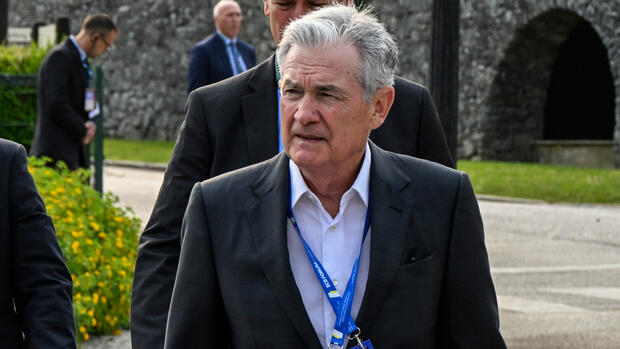According to the head of the Fed, the US central bank has already “come a long way” with its rate hikes.
(Photo: Corbis News/Getty Images)
Frankfurt Linguistic subtleties are often important in monetary policy. At its most recent meeting, the US Federal Reserve decided not to raise interest rates. Her boss, Jerome Powell, did his best to avoid speaking of an interest rate pause. But then what is it?
His answer: “I call it leaving the key interest rates unchanged at their current level,” he said at a conference of the European Central Bank (ECB) in Sintra, Portugal. Together with ECB President Christine Lagarde and his counterparts from Great Britain and Japan, he debated the future course of monetary policy.
>> Read here: Lagarde sees a new phase in the inflation process
According to Powell, the US Federal Reserve has already “come a long way” with its rate hikes. Still, he “wouldn’t take a raise off the table” in back-to-back sessions, he says. After all, inflation is still very high in parts of the service sector. This is mainly due to the fact that goods are particularly labour-intensive there.
As a result, the very tight US labor market is having a particular impact in this area, leading to higher wage increases. This, in turn, drives up corporate costs and prices. Powell described it as surprising how robust the labor market has been so far despite the interest rate hikes and the weak economy.
On the other hand, he sees signs of an easing of the price pressure for industrial goods and also for rents. For example, problems with the supply chains have been resolved. On the US housing market, on the other hand, the higher interest rates dampened price developments relatively quickly, which is gradually affecting rents as well.
Lagarde: Still a way to go
ECB President Christine Lagarde made a similar statement on developments in the euro area. “We are not seeing enough tangible evidence that core inflation is stabilizing and moving lower,” she said. What is meant is the price increase adjusted for energy and food.
According to Lagarde, the ECB still has a way to go on its tightening course. She reiterated earlier statements that the central bank is likely to hike rates again in July if underlying assumptions hold.
Core inflation is being closely monitored by the ECB. A clear decline in core inflation is an important criterion for the ECB to halt its rate hike course. Both Lagarde and Powell made it clear that they do not expect to reach the 2% inflation target this year or next.
More: Fabio Panetta to head Italy’s central bank
